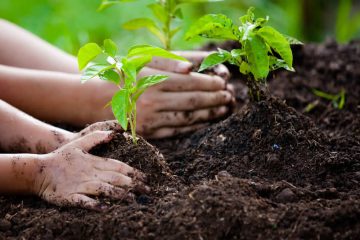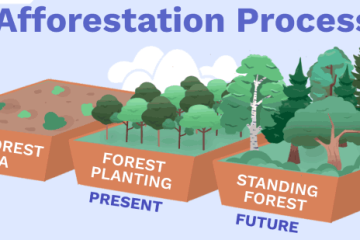“Change is coming, whether you like it or not”
– Greta Thunberg
The pandemic has allowed us to observe what scientists over the world have been saying for years: the interdependence between humanity and biodiversity is so profound that the latter’s vulnerabilities are our own”, said Audrey Azoulay, Director-General of UNESCO. As a result of failure to the realization of mutual coexistence, the human race is now experiencing its consequences. The ongoing Coronavirus pandemic could be the health effects of climate change as represented by the Center for disease control and prevention. Most of the geologists say we are in Anthropogenic epoch, where there is a commencement of significant human impact on earth ecology. Making the most undesirable changes in the ecosystem, the pandemic paused the fast-moving routines of human beings. People who were running to their works, rushing into the roads with the breakfast half-eaten are now sitting under their roofs. With the shut down of all anthropocentric activities, the earth is rejuvenating. With the entire day unscheduled, people started reconnecting with nature in their own ways during this pandemic. Most of the people started growing kitchen gardens and watering plants on their premises, now, the pandemic gave time for human beings to introspect, to realize the sense of living, to understand the importance of mutual coexistence.
Rejuvenating earth
As a result of a halt in many economic activities like the manufacturing industry, travel, and tourism industry, reduction in demands of power and fossil fuel etc., we witnessed clearer skies because about 2.6 billion metric tones of carbon dioxide is never emitted, there is a drop in nitrogen levels in the atmosphere. The seismographs registered reductions in earth vibration(Lombrana,2020). In the Indian capital Delhi, the Air Quality index lowered as 93 when compared to least recorded 161. The other species of this enriched ecosystem started roaming freely in their habitats. It also made a peaceful environment to marine species, for instance, Olive ridley turtles in Odisha, laid eggs without any interruptions, which will need enormous efforts by forest officials to protect their eggs. (Balaji, 2020).
No war, no recession and no previous pandemics have brought this enormous change. But would reduced emissions continue in the future? Definitely not, resuming all the economic activities will make the emissions levels at the peak as usual. if Shutting down all the economic activities and making unemployment to millions of people is the only way to reduce emissions, it is not possible in the long term and it is not a desirable action to reduce climate change. What we need is a sustainable long term practice to address climate change. One way forward is making future generations, ecologically intelligent.
Time for a real education
“We all have an affinity for the natural world, what Harvard biologist Edward O. Wilson calls, “biophilia.” This tug toward life is strongest at an early age when we are most alert and impressionable. Before their minds have been marinated in the culture of television, consumerism, shopping malls, computers, and freeways, children can find the magic in trees, water, animals, landscapes, and their own places. Properly cultivated and validated by caring and knowledgeable adults, fascination with nature can mature into ecological literacy and eventually into more purposeful lives”. (Orr, 2000)
The closure of schools across the world affected over 60% of the student population. when our known world is in crisis and the bookish knowledge proved to be futile, Its time to tap up the importance of ecological literacy among young minds. It not only makes the children understand the ecology but also experience it. Ecoliteracy takes place when we humans let Nature become our teacher. Ecoliteracy takes place when we form a legacy by passing our knowledge to other members of our community. (Graham.W,2018).
The need for eco pedagogy
To move from the anthropocentric vision to the planetary understanding, there is a need for an eco pedagogy. Eco-pedagogy is not just another pedagogy among many other pedagogies. It not only has meaning as an alternative global project concerned with nature preservation (Natural Ecology) and the impact made by human societies on the natural environment (Social Ecology), but also as a new model for sustainable civilization from the ecological point of view (Integral Ecology), which implies making changes to economic, social, and cultural structures. Therefore, it is connected to a utopian project—one to change current human, social, and environmental relationships. Therein lies the deep meaning of eco-pedagogy.… —Angela Antunes and Moacir Gadotti (2005).
Creating a sustainable future by making the future generations ecologically intelligent is vital to avoid the relapse of the pandemic and other climate crises. It is obvious that there will be a new normal after the pandemic, to make it sustainable one unlike the present practices in the hands of human beings.
References:
Antunes, A.,.& M. Gadotti. 2005. Eco-pedagogy as the Appropriate Pedagogy to the Earth Charter Process. In P. Blaze Corcoran (Ed.), The Earth Charter in Action: Toward a Sustainable World. Amsterdam: KIT Publishers.
Balaji, R. (2020).Blue skies, clean air: how the coronavirus lockdown is rejuvenating our environment. Your Story. Retrieved from
https://yourstory.com/socialstory/2020/04/coronavirus-lockdown-environment-air-pollution-covid-19
Graham, W. (2018). What is eco-literacy?. Natures web of life, Retrieved from http://www.freshvista.com/2018/what_is_ecoliteracy/
Lombrana,L.M.,& Warren,H .(2020).A Pandemic That Cleared Skies and Halted Cities Isn’t Slowing Global Warming. Bloomberg Green. Retrieved from
https://www.bloomberg.com/graphics/2020-how-coronavirus-impacts-climate-change/
Orr, D. (2000). A sense of wonder. In Z. Barlow & M. Crabtree (Eds.), Ecoliteracy: Mapping the terrain (p. 19). Berkeley: Living in the Real World.


